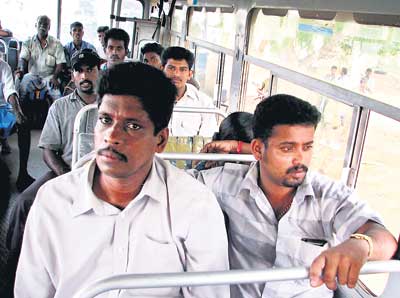
More comments on STFT email poll on Lankan crisisThe Sunday Times FT ran an email poll on the issue of abductions, the role of permanent secretaries in the light of allegations that some officials were involved in political negotiations, and the role of the business community. Four questions were given and responses (Yes, No or Undecided) called for in the poll, one of many the paper has run in recent times to gauge public opinion on a range of issues. Here are additional comments provided in the poll
Abductions - Are the police effectively
tackling the problem? * I believe some of the abductions are backed by political related parties and ex-forces personnel. Due to this even the armed forces are not in a position to take a tough stand. * The need for a stronger media and organized voice of the community is essential. * Some elements are exaggerating the situation and attempting to create a fear psychosis. The law and order situation is still better than most in South Asia albeit the conflict. There are higher levels of crime and murders (on a per capita basis) in the US than in Sri Lanka. High officials -- is there a need for parliament to review the role of the permanent secretary and ensure they are a-political? * No. These actions are hardly official and are beyond the scope of a Permanent Secretary. It calls for direction from the Minister for Public Administration, not Parliament. * Can we get back to the old times with the professional civil servants? Society being what it is, politicians and civil servants are just a reflection of our times. Do people want it (parliament approval of civil servants)? In theory yes but when you want something done, you chase after politicians who call up the civil servant. * As citizens we don’t take parliament seriously. Thus any parliamentary process is futile even if it were to take place. * Yes, along with a solid a-political national policy. * It's a poor democracy in which the civil service loses its independence and kowtows to the whims of the rulers. But the malaise runs much deeper. In mature and functioning (note these operative adjectives) democracies, the Opposition has a constructive role to play. When the party 'in power' exercises that power like a marauding colossus, the Opposition can only lick its wounds and take potshots whenever the opportunity presents itself. * An institutional device should be found to counter this menace. * Not parliament but the judiciary. * The review of candidates for high posts must be made more transparent and officials asked to agree to a code of conduct on ethics and good governance. * Politicisation is inevitable. It is up to the media and civil society to keep this politicisation in check. * Will it be effective? Wasn’t it Parliament that passed all the oppressive legislation, or provided loopholes, for many of its members and the Executive to subjugate and /or intimidate the public service as well as all aspects of public life? Business community – Should business join hands with civil society to urge both the government and the LTTE to stop fighting and resume peace talks? * When international pressure has so far failed to stop the fighting, what can business do? *Any right-minded person would agree that the government and LTTE should stop hammering each other and thrash out issues instead. But, given prevailing circumstances, the average businessman is better off keeping his mouth shut and making just enough money to survive. * A stronger civil society action is needed to which the business community could assist. * This is imperative as it’s the private sector that drives the economy. Yet one feels a certain "malaise' has set in among the business leaders today with no protests or perhaps it's due to fear of political reprisals. Is there a role for the business community in the restoration of law and order in the country? * Business and civil society play a passive role in the restoration of law and order of the country. This is a historical phenomenon. The present abductions are directed mainly towards the Tamil community. Therefore the Sinhala community is at ease since they are not affected. They should realize that it would be a matter of time that the abductors would turn to them. JBIZ (the Joint Business Forum) would be an appropriate forum to start the protest. * Business should band together for a wholesale evasion of taxes. * No - that's why we elect a government and pay taxes. Otherwise if we had the time and the inclination, we'd run the country ourselves * Yes, the business community can lobby in a civilian capacity to propose an Economic Devolution Proposal along the lines of Federalism, along with the economic rationale for it, however, without violating the sovereignty concerns of the government that can be incorporated with the Devolution Proposal being considered by the APRC * The business community is better equipped and capable of doing what the politicians should be doing. Part of the reason for the upsurge of violence is crippling poverty and rising cost of living. * Business should mount pressure on the govt. to ensure law and order and formulate peace proposals, otherwise it is commerce and industry that is taking a hit and propelling the country into economic chaos, that will lead to more troubles. General comments:
|
|
||
| || Front
Page | News
| Editorial
| Columns
| Sports
| Plus
| Financial
Times | International
| Mirror
| TV
Times | Funday Times|| |
| |
Copyright
2007 Wijeya
Newspapers Ltd.Colombo. Sri Lanka. |
